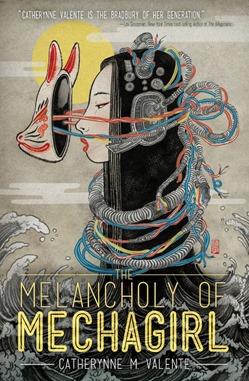The Melancholy of Mechagirl is a remarkable collection of stories and poems that are (mostly) in some way connected with/to Japan. The writer, Catherynne M. Valente, could well be this generation’s Ray Bradbury.
The Melancholy of Mechagirl by Catherynne M. Valente; 224 pages; Haikasoru (VIZ Media)
The thirteen stories and poems collected in The Melancholy of Mechagirl reflect Valente’s decade spent in Japan. Their subjects vary between the poetic musings of the female pilot of a giant mecha, the lives and loves of three normally inanimate objects and an alternate history where Joe McCarthy became president and nuclear war is being waged.
Here there are Japanese gods, lonely women, haunted islands and monsters both human and non; love achieved, love lost and love barely imagined.
In one tale, Ink, Water, Milk, there are three series of events that occur concurrently – though they must be related one at a time, with cross-cutting between them to keep the reader connected, thematically to all of them. Most of its characters are yokai (non-human). Another story, Killswitch, details the playing of a videogame that can only ever be played once by any given player – and no copy of the game can ever be played more than once.
Some of the stories are semi-autobiographical: the main character lives a similar life to the writer, but with some sort of fantasy element added – usually to give a deeper sense of the emotions at play in her life and the depths to which her sense of home has changed.
My personal favorite is Thirteen Ways of Looking at Space/Time, an original spin on the creation myth that makes a frequently hilarious examination of the beginning of everything by taking various myths and juxtaposing them with a meditation on the question of where writers get their ideas. That this is one of the stories where Valente mixes in autobiographical details makes it as unexpectedly moving as it is funny.
Neil Gaiman once said that ’Google will give you one hundred thousand answers; a librarian will give you the correct one. There is that kind of rightness to Valente’s writing. Like the late Ray Bradbury, her writing has a delicacy and precision to it that is not only very effective, but incredibly specific. There are thousands of ways that each of her stories might have been told, but the one she chose is the only right one.
The Melancholy of Mechagirl includes a foreword by Japanese critic Teryuki Hashimoto and an Afterword by Valente.
Final Grade: A
Cover art courtesy of VIZ Media
